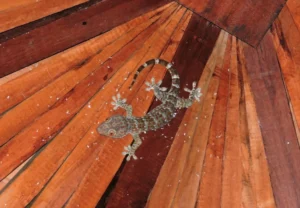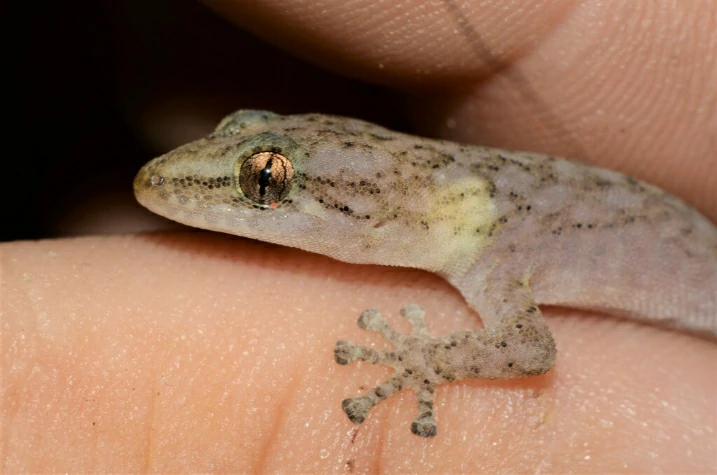If you’ve ever heard what sounds like a tiny bird chirping in your house at night, you might actually be hearing a gecko. These small lizards make distinctive chirping sounds that can be surprisingly loud. But why do geckos chirp?
Geckos chirp to communicate with other geckos. Male geckos chirp to mark their territory and tell other males to stay away. They also chirp to attract female geckos during mating season. Sometimes geckos chirp when they’re scared or excited too.
The chirping sound is the main noise geckos make. It’s how they “talk” to each other, especially when it’s dark and they can’t see well.
Their chirps are like little conversations that carry important messages, even though we just hear them as random clicks.
What Does Gecko Chirping Actually Sound Like?
Gecko chirps sound like quick, high-pitched clicks that come in fast sequences. Some people say it sounds like a tiny bird, while others think it’s more like clicking or ticking.
The sound can vary between species. Some make soft, musical chirps, while others produce louder, harsher clicks.

If you listen closely, you’ll notice the chirps aren’t random. They come in patterns; sometimes short bursts, sometimes long sequences that can last for several minutes.
Interestingly, some geckos even pause between chirps to listen for responses, which makes it more like a back-and-forth conversation than just constant noise.
Male Geckos Use Chirps to Protect Their Territory
The most common reason male geckos chirp is to defend their territory. When a male finds a good spot with plenty of insects and safe hiding places, he wants to keep it for himself.
He’ll chirp throughout the night to announce that the area is taken. These chirps are like a “no trespassing” sign for other males.
Research shows geckos can even recognize individual voices. They can tell if a chirp comes from a familiar neighbor or a new intruder. This helps avoid unnecessary fights, which could be dangerous.
Male Geckos Chirp to Get a Female’s Attention
During breeding season, males chirp even more. These mating chirps are slightly different; they’re softer and more rhythmic.
A male perches in his territory and chirps repeatedly, hoping a female will hear him. The better he sounds, the more likely he is to attract a mate.

Females can tell a lot about a male’s health and strength just by listening to his voice.
Sometimes males even change their chirps to outcompete rivals, creating a sort of “vocal competition” that impresses females.
How Do Geckos Make Chirping Sounds?
Geckos chirp using vocal cords in their throat. When a gecko wants to chirp, it pushes air from its lungs past the cords, making them vibrate.
The vibration creates the clicking sound we hear. By adjusting the airflow and cord tightness, geckos can change the pitch and volume of their chirps.
Bigger geckos make deeper chirps, and smaller geckos make higher-pitched sounds. That’s why house geckos and leopard geckos sound different, even if they live in the same area.
Why Do Geckos Chirp More at Night?
Most geckos are nocturnal, which means they’re active at night and sleep during the day. That’s why you hear them chirping after dark.
At night, geckos hunt insects, look for mates, and patrol their territory. All of this means lots of communication, so lots of chirping.

The darkness makes sound especially important. When geckos can’t see well, they rely on chirps to know who’s around and what’s happening.
Chirping is like their nighttime GPS and social network rolled into one.
Different Chirp Patterns Mean Different Things
Not all chirps are the same. Geckos use different patterns to send different messages.
Slow, steady chirps usually mean “this is my territory, stay out.” Fast, urgent chirps might mean “I found a female” or “danger nearby.”
Some chirps are aggressive and louder, signaling a fight might happen.
By changing pitch, rhythm, and volume, geckos can share a surprising amount of information with just a simple chirp.
Do All Geckos Chirp?
Not all geckos chirp. Many do, especially nocturnal and territorial species, but some are almost silent.
House geckos, day geckos, and tokay geckos are loud and frequent chirpers. Leopard geckos, crested geckos, and some other pets are quieter.

These species rely more on body language or subtle signals.
Male and female geckos also chirp differently. Males are the loudest, especially for defending territory or attracting mates. Females chirp too, but usually softer, shorter, and less often. In some species, females only chirp in response to males or when stressed.
So if you hear chirping at night, it’s probably a male gecko. Female chirps are rare and easy to miss unless you listen closely.
House Geckos Are the Loudest Chirpers
If you live in a warm area, the geckos around your home are probably house geckos. These small gray or brown lizards are famous for their loud chirping.
House geckos are much noisier than most species. Their chirps can be heard through walls and sometimes wake people at night.
Even though they’re loud, they’re helpful. They eat lots of insects, including mosquitoes, cockroaches, and moths. Their chirping is a small price for free, natural pest control.
Do Baby Geckos Chirp Too?
Baby geckos can chirp from hatching, but their chirps are softer. As they grow, the chirps get louder and more complex.

Young geckos learn by listening to adults. If a baby grows up without other geckos, it might not develop normal chirping patterns.
Some social species learn faster, showing that gecko communication has a learning component.
Geckos Chirp When They’re Scared or Stressed
Geckos also chirp when stressed, scared, or uncomfortable.
If you pick up a gecko that doesn’t want to be held, it might chirp as a warning. Stress chirps are usually faster and more frantic than normal chirps.
Pet geckos might chirp when you first bring them home or move their tank. It’s their way of saying “stay away” or “I’m uncomfortable.”
Why Some Pet Geckos Don’t Chirp Much
If your pet gecko is quiet, that’s normal. Alone geckos have no one to talk to, so they stay quieter than wild ones.
Leopard geckos and crested geckos are naturally quieter. You might hear them chirp occasionally, especially during breeding season.

Male pet geckos chirp more than females, especially if they can sense other geckos nearby.
Gecko Chirps Help Them Avoid Fighting
By chirping, geckos can often avoid fights. When two males meet, they usually start by chirping at each other.
The louder or deeper chirper often “wins” without fighting. The other gecko leaves, avoiding injury.
Research shows vocal contests prevent injuries that would happen if geckos always fought over territory. Chirping is basically a safe way to settle disagreements.
Why Geckos Chirp More During Certain Times of Year
Geckos chirp more at certain times, especially breeding season. In tropical areas, you might hear constant chirping at night.
In cooler seasons, geckos chirp less. Some species barely make a sound in winter.
The start of breeding season is often the loudest time. Males compete for territory and mates, creating long nighttime “conversations.”
Can Geckos Control Their Chirping?
Yes, geckos control when and how they chirp. They don’t make sounds involuntarily; each chirp is a choice.
A gecko that feels safe chirps normally. If it senses danger, it can stop immediately to hide.
During aggressive encounters, geckos can make chirps louder and faster to intimidate rivals. They’re basically choosing when and how to “speak” like little lizard strategists.
How to Handle Geckos That Chirp Around Your Home
If you have chirping geckos at home, it might be annoying at first. Most people get used to it within a few days.

Some even find it comforting. The rhythm becomes part of the nighttime background noise.
Remember, geckos eat lots of pest insects. Their chirping is a small price for free pest control that’s safe and natural. They’re helping you while having their little nighttime conversations.
Frequently asked Questions
Which gecko species are known for chirping?
Some geckos, like tokay geckos, crested geckos, and house geckos, are known for chirping. These species use chirps and clicks to communicate, especially at night.
What does it mean when my gecko chirps?
Chirping is how geckos “talk”. Males often chirp to mark territory or attract females. Both males and females may also chirp when they’re stressed, curious, or excited.
Do all geckos chirp or just some species?
Not all geckos chirp. Some species are mostly silent, while others are very vocal, especially at night.
Why do male geckos chirp more than females?
Males geckos chirp more to claim territory and find mates. Females are the quieter sex, and may chirp sometimes, but usually less often and for different reasons, like alerting to stress or danger.
Can geckos hear each other when they chirp?
Yes, geckos can hear each other’s chirps. This helps them communicate in the dark, avoid fights, and find mates.
Conclusion
Geckos chirp because it’s their main way of communicating. Each chirp carries meaning: defending territory, attracting a mate, or warning about danger.
What sounds like random noise to us is actually a complex language geckos understand perfectly. Males are the loudest, using their voices to compete with other males and impress females.
Next time you hear a gecko chirping at night, you’ll know what’s happening. Those little lizards are talking, announcing their presence, and living their lives; and chirping is how they do it all.
Hi, my name is Ezra Mushala, i have been interested animals all my life. I am the main author and editor here at snakeinformer.com.

